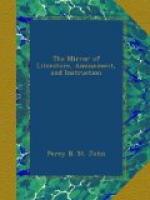The etymology of the name of this fair has been much disputed. A silly tradition has been handed down, of a pedlar who travelled from the north to this fair, where, being very weary, he fell asleep at the only inn in the place. A person coming into the room where he lay, the pedlar’s dog growled and woke his master, who called out, “Stir, bitch”; when the dog seized the man by the throat, which proved to be the master of the inn, who, to get released from the gripe of the dog, confessed his intention was, with the aid of the ferryman who rowed him over from Chesterton, to rob the pedlar; from which circumstance the fair ever after obtained the name of Stirbitch. But a more reasonable derivation might be found in the known custom of holding a festival on the anniversary of the dedication of any religious foundation. There is a small and very ancient chapel, or oratory, of Saxon architecture, still standing in the field where the fair is kept; but to what saint dedicated, is not recorded. I know not if a St. Ower is to be found in the calendar; if there is, it will, by adding “wijk,” or “wych,” a district or boundary, be no great stretch of invention to account for a transition from “St. Ower wijch” to Stirbitch; or perhaps from a rivulet which empties itself into the Cam at Quy-water, small streams, in some counties, being called “stours.”
Leaving this argument, however, at the road-side chapel, we must proceed to the fair, where the “busy hum of men” announced the approach of the mayor and corporate body to make proclamation. First are,
Mr. Samuel Saul, the beadle, and
his
assistant, in full costume, with their
staves tipped with silver, bearing
the arms of the Corporation.
Next followed two trumpeters, in gowns,
on horseback.
Sackbut and clarionets.
The mace.
The Worshipful the Mayor, in a scarlet gown.
The Vicar of Barnwell, (formerly the
Abbot,) and other of the Clergy
and Collegians.
The Corporate Body, two and two.
The Deputy Beadle.
All the train, as above, on horseback,
robed in full costume.
Then followed Gentlemen and Ladies
in
their carriages and on horseback,
invited by the Mayor to the grand
dinner given on the occasion.
The proclamation was read, (heads uncovered,) first at the upper end of the fair, next in the Mead where the pottery and coal fair were held, and last at a little inn near the horse fair, in which place a “Pied-poudre” court was held during the fair, for deciding disputes between buyers and sellers, and for punishing abuses and breaches of the peace in a summary way—stocks and a whipping-post being placed before the door for that purpose. Here the mayor and the cavalcade partook of some refreshment.




